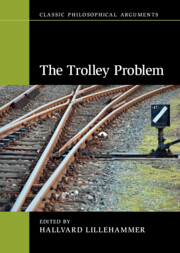Book contents
- The Trolley Problem
- Classic Philosophical Arguments
- The Trolley Problem
- Copyright page
- Contents
- Tables
- Contributors
- Acknowledgments
- Introduction
- 1 Keeping track of your trolleys
- 2 Shunted trolleys and other diversions
- 3 Must we turn the trolley?
- 4 Non-consequentialism in light of the trolley problem
- 5 Non-consequentialist principles under conditions of uncertainty
- 6 The trolley problem and the doing/allowing distinction
- 7 Virtue ethics and the trolley problem
- 8 Trolley dilemmas from the philosopher’s armchair to the psychologist’s lab
- 9 Trolleyology
- 10 Cross-cultural responses to trolley problems and their implications for moral philosophy or
- 11 Ethical accident algorithms for autonomous vehicles and the trolley problem
- 12 A new trolley problem?
- Bibliography
- Index
11 - Ethical accident algorithms for autonomous vehicles and the trolley problem
Three philosophical disputes
Published online by Cambridge University Press: 24 February 2023
- The Trolley Problem
- Classic Philosophical Arguments
- The Trolley Problem
- Copyright page
- Contents
- Tables
- Contributors
- Acknowledgments
- Introduction
- 1 Keeping track of your trolleys
- 2 Shunted trolleys and other diversions
- 3 Must we turn the trolley?
- 4 Non-consequentialism in light of the trolley problem
- 5 Non-consequentialist principles under conditions of uncertainty
- 6 The trolley problem and the doing/allowing distinction
- 7 Virtue ethics and the trolley problem
- 8 Trolley dilemmas from the philosopher’s armchair to the psychologist’s lab
- 9 Trolleyology
- 10 Cross-cultural responses to trolley problems and their implications for moral philosophy or
- 11 Ethical accident algorithms for autonomous vehicles and the trolley problem
- 12 A new trolley problem?
- Bibliography
- Index
Summary
This chapter discusses three philosophical disputes concerning the comparison between the ethics of crashing autonomous vehicles and the Trolley Problem. The first dispute concerns whether there is something ethically problematic – or perhaps even flippant – about comparing the real-world issue of what autonomous vehicles should do in accident scenarios with the philosophy of the Trolley Problem. The second dispute concerns whether or not there is a close enough analogy between real-world accidents involving autonomous vehicles and the so-called trolley cases discussed in relation to the Trolley Problem. The third dispute concerns whether or not the large literature on the Trolley Problem discusses topics directly relevant to the real-world ethics of crashes with autonomous vehicles. The chapter considers key arguments on each side of the dispute. It also offers a diagnosis regarding whether the Trolley Problem is relevant for the ethics of autonomous vehicles. The conclusion is that it is either directly or indirectly relevant: It may be directly relevant because the Trolley Problem can teach us important lessons or indirectly relevant because identifying key differences between the ethics of autonomous vehicles and the Trolley Problem allows us to get clear on what matters most in the real-world ethics of autonomous vehicles.
Keywords
- Type
- Chapter
- Information
- The Trolley Problem , pp. 211 - 230Publisher: Cambridge University PressPrint publication year: 2023
- 1
- Cited by



